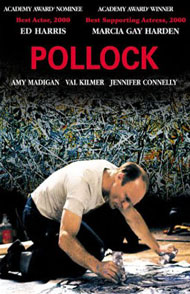
Pollock
(2000)

Rated: R
Runtime: 2 Hours and 2 Minutes
Reviewer: Jones
Grade: AA man is crouching over a canvas. He has just begun work on his latest creation when he hesitates. It is during this hesitation that he will achieve, what all artists long for, a breakthrough. He has just dipped his brush in a can of paint when he pauses only to, after a time, notice the paint dripping off of the brush and onto the floor. He sees the pattern the dribbling paint has begun to form on the floor and he is struck by a moment of inspiration. He stands over the canvas, dips the brush in the paint and holds it above the canvas making elegant movements as if he were conducting an orchestra. The moment finally takes hold of him and he begins to use the brush as if it were a catapult, flailing bursts of paint upon the canvas. It is in this moment that Jackson Pollock finds himself born again.
The brilliance of "Pollock" lies in its characters and how it chooses to let us into their lives. Moments, such as the scene described above, never feel forced, but rather they feel like they are being discovered for the first time. The breakthrough described above never feels as if it is a recreation with Ed Harris portraying Pollock, but rather it feels as if we are watching Pollock himself being taken hold of by the moment of genius that would put him on the cover of Life magazine. The film works because of the authentic feel that these most important of scenes manage to capture.
I have to applaud the film for its bravery in how it chooses to tell its story. It takes a rather disconcerting approach to its presentation during the time spent in New York City during the first part of the film. During this time we meet Jackson Pollock (Ed Harris) and the people who would have an impact on his life, for better or worse. By way of an unexpected meeting with a fellow artist, who doubles as a critic, he meets the woman who will eventually become his wife (Marcia Gay Harden). After her meeting with Pollock she becomes a crusader for Pollock’s work and manages to arrange for a meeting with Peggy Guggenheim. Things go well and Pollock finds himself hosting his own exclusive showing at one of Peggy’s museums.
One would think all was well in his life, but, as we are shown through the disconcerting presentation I mentioned before, all is not well.
Jackson is a drunk, plain and simple. We see this in the film’s second scene as his brother attempts to drag him to him to his room. During his time in the Big Apple, scenes end abruptly and are followed by scenes that seem entirely unrelated. This makes the film hard to watch and what some might even call amateurish, especially considering this is Harris’ directorial debut. I actually had this thought as I watched, but then the wheels began to turn and the understanding of what Harris was attempting to do here came to me. I think, by using this jarring, detached method of editing, he was attempting to capture the mindset of Pollock in the mind of the viewer during the exposition of the film in order to prepare the viewer for the trip they were taking. If that is the case, he succeeded admirably. You see the film this way, because the man the film is portraying is a drunk, who manages to lead two lives in order to make it through his life. One scene he’ll be drunk as a skunk and in the next he’ll be eating breakfast. It’s an interesting effect that was not lost on me.
To contrast Pollock’s life in New York City the film takes the viewer to the farm in the country where he would have some of his best and worst years. The way the film is constructed reflects the nature of the early years on the farm. Scenes flow into one another with a natural progression, rather than the abstract manner of the earlier time in the film. It is during this time on the farm that a sober Jackson makes his aforementioned breakthrough and the money finally begins to roll in. As is the case with Pollock, the good times can never overcome the darker side of his life.
The life of Jackson Pollock was a roller coaster ride that would make Great America jealous. Ed Harris ("The Rock") puts a human face of intensity and insecurity on this bleakest of rides that can be described as one of the finest performances of 2000 if not in fact the best. He brings a level of determination and intensity with him into every scene that lends itself well to the demands of the role. The intensity carries over into the work he portrays on screen. There is a scene in the film in which Pollock locks himself in a room contemplating what to do with a canvas that will cover an entire wall in Peggy Guggenheim’s home. After a great deal of thought he lets loose with a fury of paint and passion that results in a scene that carries with it as much tension and excitement as any action scene you saw in the theater in the past year. It is a scene that I found myself not wanting to see end, because while watching him paint you are watching him create something through an endless spiral of discovery. Now that’s exciting.
When he is not at work, he is often seen with his wife who is played admirably by Marcia Gay Harden ("Space Cowboys"). This role could have very easily fallen into the abyss of limited character development that is the wife who is devoted to a man who is anything but deserving of her affection. Instead of phoning the performance in Harden makes it her own in a role that is anything but easy to convey. She is a woman who is in love with a man, who I best described as the lone destructive force in her life. She believes in a man who does not believe in himself, and who never will no matter how hard she tries to make him. There are so many fine little touches that she puts on the role, such as when she delivers a "you’re in trouble now" glance in Jackson’s direction on more than one occasion. It is a great performance by a wonderful actress who is finally getting her much deserved respect after so many years.
"Pollock" was a labor of love for Harris that was some ten years in the making and believe me it shows in every frame. It is obvious that a great deal of time and care went into making this film exactly as Harris envisioned it. It’s just a shame that more films weren’t so adored by their makers. Film would be a much more interesting art form if they were.
This is not a film for everybody. If you are a person who likes lighthearted fare that bestows laughter upon the audience every few minutes then you should probably steer clear of this one. I counted maybe two brief moments of fairly inaudible laughter during the course of the film. On the other hand, if you enjoy films that delve into the inner turmoil of their characters without regard for what might be found, or if you find yourself way to happy, and in need of a good dose of reality, "Pollock" would be a fine film for you to spend your hard earned dollars on. It is more than capable of bringing even the silliest of sods back down to Earth.
